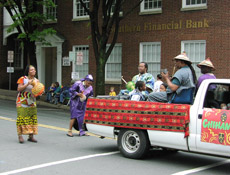Suggestions about ongoing processes

Reinterpretation of individual and communal identities -- a parade in Charlottesville, VA

Reuse and linkage into new communities -- Paris. Photo by Tomas Wikstrom
As with the other suggestions, these pertain mostly to already built suburbs. They are independent of the larger and more controversial policy changes that would have a greater impact on suburban places.
Suburban places need to remind inhabitants of their own processes of active interpretation and their resolution of multiple roles and demands. There should be opportunities to participate in the ongoing reformation and reproduction of the place's spatial structures and social norms.
- Many organizations think of themselves as passing on and protecting the values and norms of their community. Homeowners associations, the traditional service organizations like Rotary, chambers of commerce, neighborhood associations, churches, and so on -- these may affirm the complexities of the community, or they defend narrow visions and economic privileges. They may not realize the extent to which they reinterpret and alter the place's norms to fit new circumstances. Arranging confrontations between different interpretations of local norms and patterns might make this active reinterpretation more self-aware.
- Some small interventions might make communal processes of interpretation and reproduction more present in the architectural surroundings, encouraging people to participate more actively.
- To make the community more present to itself, what if there were screens for local news on the outside of civic buildings, or the cable company ran announcements across their bottom of their TV screens reporting on local environmental processes and community changes and debates?
- Are there ways other than defensive zoning and planning hearings give people a sense of participating in the process of change? For instance, staging intense charrettes in which many local inhabitants of different status and expertise participate. The occasions need not be zoning or land use; they could be matters of school or recreation policy, utility regulation, disputes with neighboring areas, and so on. Such discussions make everyone involved more aware of the complexities of the place and the active effort needed to interpret and carry on its norms in new situations.
- Suggestions about planning for greater density
- Suggestions about style and architecture
- Suggestions about accentuating linkage
- Return to "some hesistant suggestions"
- [Nearby: Sprawl Outline -- A Swedish example ]